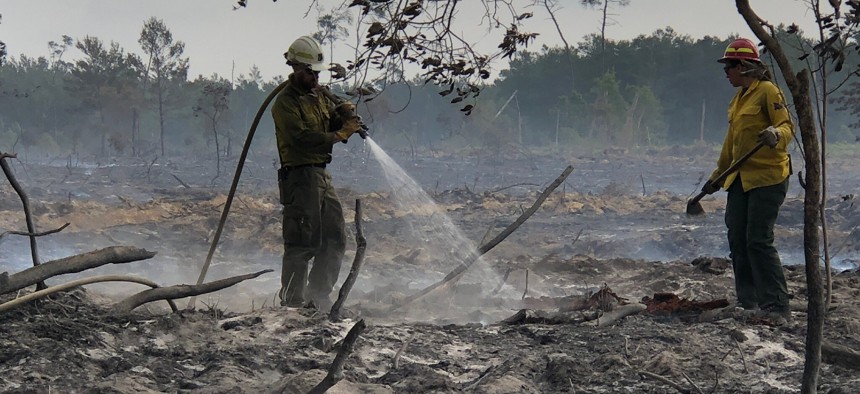
Ocala National Forest firefighters during the Stanley Fire on April 13, 2020. The Biden administration has made improving federal firefighter compensation a key workforce priority. U.S. Forest Service
A Union Is Calling on the Administration to Do More to Retain Federal Firefighters
The Biden Administration secured significant pay raises for wildland firefighters as part of the bipartisan infrastructure law, but those increases are, for now, temporary and an exodus to stabler positions has continued.
The National Federation of Federal Employees this week urged agency leaders to do more to retain the corps of federal wildland firefighters as work to follow up on a series of temporary improvements to their pay and benefits.
The Biden administration has made improving federal firefighter compensation a key workforce priority. As recently as 2021, federal wildland firefighters made only $13 per hour, below President Biden’s $15 minimum wage for federal workers and significantly lagging behind the pay of firefighters serving in state and local governments.
In August 2021, Biden issued a series of cash bonuses to bring federal wildland firefighters’ pay equivalent to $15 per hour for that year. And last fall, Congress included provisions aimed at reforming firefighter compensation in the bipartisan infrastructure law, including increasing the pay of federal firefighters in regions where it is difficult to recruit or retain them by $20,000 per year or 50% of their base salary, whichever is lower.
In June, the Biden administration announced that those raises would go to all federal wildland firefighters, citing staffing shortages across the country. But funding provided through the infrastructure law only covered the costs of those raises through fiscal 2023, although the administration has signaled that it will work with Congress to secure appropriations and ensure the pay raises are permanent. The Office of Personnel Management is also working with agencies that employ wildland firefighters to develop a new occupational series that more adequately reflects firefighters’ duties and better compensates them.
In a letter to Agriculture Secretary Tom Vilsack and U.S. Forest Service Chief Randy Moore, National Federation of Federal Employees Randy Erwin, whose union represents around 10,000 federal wildland firefighters, said that while his organization appreciations the administration’s efforts thus far to improve firefighter pay, the uncertainty around lack of permanent funding and the as yet incomplete occupational series process means firefighters continue to leave federal service.
“NFFE members are still facing financial insecurity because the recent pay increase approved and funded in the Infrastructure Investment and Jobs Act is only temporary,” Erwin wrote. “As such, firefighters continue to look for and take jobs outside of federal service. Our employees are unquestionably dedicated to their careers and their country as federal wildland firefighters. However, pay parity, mental health, burnout and housing issues persist, forcing many to leave federal service for other job opportunities free of those burdens.”
Erwin also urged the department to improve its recruitment of more experienced firefighters, as the recent exodus means entry-level firefighters are being asked to perform higher level duties than their training prepares them for.
“NFFE was informed of a recent hiring and training pattern within the [Forest Service] that may cause safety concerns regarding proper training: newer employees are performing at levels higher than their pay grade because of the need to replace higher grade firefighters who have left federal service,” he wrote. “This situation is compounded by existing vacancies in the workforce that go unfilled for a year or longer. All employees report that it is common to perform duties well above and beyond their position descriptions.”
As agencies continue to work on developing and implementing a new occupational series for federal wildland firefighters, Erwin stressed the importance of including elements like a career ladder as well as increased compensation for firefighters with relevant qualifications and certifications.
“As you know, career ladders and job mobility are critical to expand a firefighter’s expertise, prevent burnout and improve retention,” he wrote. “Position descriptions do not currently list the qualifications a firefighter holds on the fire line for any position below a GS-9. However, our members are acquiring and using qualifications to perform duties outside of their [position description] all the time. The way in which the work is currently performed naturally conforms to a career ladder, except our members are not paid, recognized or promoted along one.”
NEXT STORY: Your Guide to Pay and Benefits During a Shutdown







